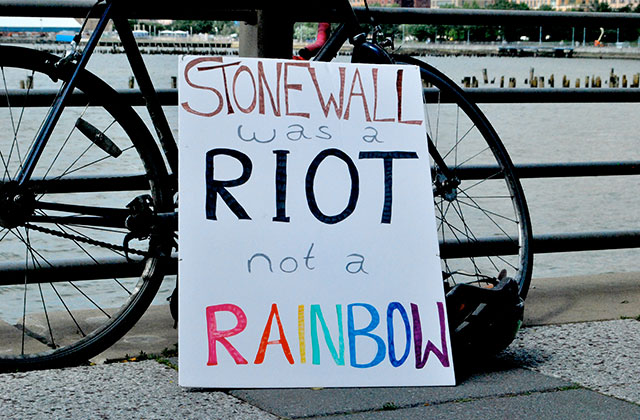January 2, 2014 was a cold day in New York City and Tanya Walker remembers it well. The 51-year-old had surgery that day after being diagnosed with lung cancer. "I was homebound, and the weather was so cold I couldn’t breathe outside," she explains.
As a black trans woman, Walker was in an unenviable position. Aside from structural barriers that create disproportionate obstacles to healthcare, Walker doesn’t have much family support in New York. But she hasn’t had to face her illness alone.
Walker says she started coughing up blood about a year ago, and soon visited a doctor. After blood work and several scans, she was diagnosed with Stage Three lung cancer and told that she would need an operation, chemotherapy and radiation. A longtime member of the Audre Lorde Project (ALP), Walker says she brought up her diagnosis to her fellow members. "And all of the sudden they said, ‘Why don’t we get together as a community and help Tanya out through this illness?’"
Being transgender means one is more likely to suffer poverty, homelessness and criminalization. The violence carried out upon trans and gender non-conforming people lowers their life expectancy. But for those who do make it to middle age, there’s little in the way of resources for housing, employment and healthcare. As an active part of New York’s trans community, however, Tanya Walker says she got the support she needed. And a lot of it came through ALP.
The help that Walker received was highly coordinated. ALP staffers and members sat down and asked Walker about her specific needs and then mapped out a safety plan that centered on her wellness–not only physically, but also emotionally and spiritually as well. For two months at the start of this year–through snow and freezing temperatures–some 30 people volunteered their time and resources to join Walker for her appointments and treatments, and also cooked and delivered food to her on a daily basis.
Planning such an endeavor for someone undergoing cancer treatment might sound daunting, but those who took care of Walker say it’s simply what a community does to take care of one of it’s own. "It wasn’t difficult for us to come together," says ALP’s Gina George.
ALP demonstrates what it means to actively support its elders. For some in the trans community that kind of action doesn’t always match up with what some call the mainstream gay rights narrative.
Throughout the country Pride parades took place on Sunday. Pride commemorates the Stonewall Riots, which occurred 45 years ago and were sparked by Sylvia Rivera, a trans woman of color. Greenwich Village, the site of the Stonewall Riots in 1969, is now dotted with rainbow ads marking summer sales; some storefronts even offer mimosas and hors d’oeuvres to celebrate gay pride. Those offers, however, exist in stark contrast to the lives of trans people–and to trans women of color especially–who remain under attack.
Just two days before Pride, Christopher Street pier was the site of the tenth annual Trans Day of Action, which more than 1,000 people attended. One attendee, Cynthia X, held a bright yellow sign that read, "Stonewall was a riot!" The 27-year-old thinks that too much is lost in mainstream celebrations. "Stonewall was a sacrifice of trans women of color that gets more whitewashed every year," she says. "Like the chant says, ‘Fuck your assimilation, we want our liberation.’"
For people like Cynthia X, liberation means access to basic needs like employment, healthcare and housing–without the risk of death that so often haunts trans women of color.
On Sunday, meanwhile, Pride kicked off in New York with "Orange is the New Black’s" Laverne Cox as one of three grand marshals. Cox, who donned the cover of Time, has come to represent a wider acceptance of black trans women in the mainstream. That kind of visibility is important, but not everyone is convinced that it’s making trans women safer.
"It hasn’t changed anything at all, "says Walker. "Transmisogyny still marginalizes trans women of color."
ALP’s George does think the kind of visibly that Cox and Janet Mock have is important–especially for young trans people to know that there is hope beyond violence and disappointment. But as much as ALP works to confront the issues of basic housing, healthcare and employment, the financial resources for that kind of work are limited.
"There really is no funding–a lot folks come out of their pockets to help our community, and it’s an important opportunity for the funding machines to think about that," says George. She points out that finding senior housing for trans women in New York, for example, is unheard of.
Tanya Walker no longer needs people to cook and deliver her meals. After intensive treatment, she’ll soon find out whether the cancer has been eradicated, or if she’ll have to continue fighting it. Walker addressed Trans Day of Action participants on Friday, who reveled in her presence. And she says that she knows that no matter what her upcoming diagnosis brings for her, she’ll have the backing of a community that’s invested in taking care of its elders.
